 |
|
Models of Excellence Honorees
|
 |
Franklin University
My Transfer Credit
With more than 90 percent of incoming Franklin University students transferring prior college coursework, applicants need to quickly determine which of their earned credits are transferable, how long it will take them to finish their degree based on that information, and what it will cost. The school rolled out the MyTransferCredit app in July 2014, dramatically shortening that analysis process from a few weeks to just a few seconds. More than 120,000 students have accessed the tool since its inception. Read the full story.
University of Wisconsin-Parkside
The App Factory
In 2014, the University of Wisconsin-Parkside established the App Factory, a year-round paid internship program where students apply their classroom experiences to create mobile apps and web tools for local businesses. To date, the program has generated more than a dozen paid projects and in excess of $150,000 in revenue, which goes directly to student salaries. This year, every student intern also graduated with a job waiting for them, thanks to their App Factory experience. Read the full story.
Middle Tennessee State University
The REBOUND Program
To reach at-risk freshman early on, Middle Tennessee State University initiated REBOUND, a program that takes place between first-year semesters for students who post a GPA below 2.0. At a two-day event, students attend workshops covering financial aid, study skills, time management, tutoring, and personal accountability. They also meet with academic advisers to review and revise their spring schedules as needed. Eighteen percent of eligible students participated in the first REBOUND event, with nearly 46 percent returning to classes the following fall, compared to 29.4 percent of eligible students who did not return. Read the full story.
Cleveland State University
Sullivan-Deckard Scholars Opportunity Program
The Sullivan-Deckard Scholars Opportunity program targets high school students aging out of foster care—fewer than half of whom traditionally apply to college, with less than 10 percent earning degrees—and encourages them to apply to Cleveland State. Once admitted and enrolled, students are given tuition, free housing, a laptop, work-study employment, and books, plus are provided professional and peer mentoring, financial guidance, and counseling. The university even collaborates with external social service agencies to further encourage success. Read the full story. |
 |
California State University, San Bernardino
Vital and Expanded Technologies Initiative
After the California State system allowed schools to levy fees to support student success initiatives, the San Bernardino campus set up the Vital and Expanded Technologies Initiative to award grants to fund technology projects that directly enhance student learning and success. Over the past three years, the initiative has funded more than four dozen projects, including the development of advanced handheld GPS technology for the geography department, a library laptop lending program, and an upgrade to the multimedia language center computer lab. Read the full story.
Indiana University Southwest
First Year Retention and Student Transition (FYRST) Program
The FYRST program targets academically struggling first-year students who lose crucial financial aid and need guidance in managing resources to continue their education. In addition to encouraging professors to increase academic intervention, the university offers financial literacy support and incentives to make up course credits over the summer, such as a $150 grant to defray the cost of books for students who register for at least six hours of classes. The program also offers a career development component, outside speakers and a persistence coordinator. Read the full story.
University of Nebraska-Lincoln
Academic Probation Recovery Program
After determining that students on academic probation were not seeking out the help they needed to improve their grades, the University of Nebraska-Lincoln began creating recovery plans that include in-person meetings with advisers. Students who don’t meet with their advisers are prohibited from registering for classes the next year. After meeting with advisers and developing plans, students are monitored and supported with workshops and tutoring. Read the full story.
Christopher Newport University
Captains Anchored for Success: A University-wide Retention Program Enhanced by Technology
The entire campus of Christopher Newport University participates in an array of retention programs that results in 87.5 percent of first-year students returning for a second year, an increase of more than 12 percent from a decade ago. Among the strategies: thematic learning communities that house like-minded students in the same classes as freshman; special advising and technology-backed early warning systems; and the Recruit Back initiative, where recent graduates track students who left the university before degree completion and encourage them to return. Read the full story.
LDS Business College
Mock Interview Week
To better guide students on how to conduct themselves during their inevitable post-graduation job search, LDS requires students to participate in 20-minute mock job interviews. Conducted by LDS instructional and administrative staff, each session includes a range of practical interview questions; students must also arrive on time, be dressed appropriately, and be prepared with questions of their own. During the spring 2016 semester, 250 students were interviewed over the course of the week. Read the full story.
|
 |
|
|
|
|
This e-mail was sent to: [EMAIL].
One Click Unsubscribe | Manage My Subscriptions
[COPYRIGHT]
35 Nutmeg Drive Suite 205, Trumbull, CT, 06611 |
|